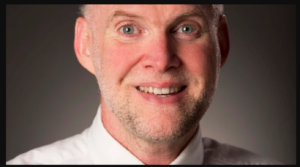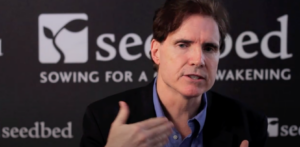On any given Sunday, United Methodist churches gather to worship God in nearly 60 nations around the globe. Across multiple time zones, languages and cultures, our tribe attempts to be a witness to Christ in a hurting world. The one entity – and the only entity — that speaks for that international witness is the General Conference, a global body. It is smack dab in the center of what it means to be United Methodist.
Regrettably, that body — and our United Methodist Church — is in a season of crisis. The Greek word krisis means “to separate, distinguish, judge,” and can apply to both positive and negative experiences. A crisis can be an opportunity to shake loose the needless and redeem the needful. I am convinced that all of us in the UM Church, no matter what theological position we take, are hoping for a positive end to a crisis-heavy season.
A group of clergy within our denomination have recently organized themselves under the banner of the Methodist Middle. For those of us supportive of the global Methodist center, we welcome these voices. This is a big denomination and everyone should have an opportunity to be heard.
It is charitably fair to assume that the Methodist Middle was not looking for a crisis. Who would? While they’ve been more hopeful, progressives and conservatives (or traditionalists or orthodox believers), have felt the pressure of a growing tension. Truth be told, those in the Middle have felt it, too, though in a different way. They’ve struggled to hold the tensions together in one hand and may even consider themselves the voice of tempered reason in a world of extremes. It must be frustrating to find themselves now — after years of asking us not to take sides — creating a “side.” As the Middle organizes and communicates with the average layperson, allow me to make a few observations and one appeal.
Unity can’t be the goal.
First, it seems as if the Middle is asking the people in the pews to make theology less important than unity. To those who pay attention, it sounds as if the Middle wants the entire global denomination to adopt and/or accept a liberal position on human sexuality. In exchange, it seems, United Methodism would keep much of the rest of our theology in tact. By suggesting this path, the Middle seems to be reducing the crisis down to one issue — a mistake that would take us backward by several decades.
This kind of proposal turns a blind eye to the widening and pervasive theological gap that has been developing over decades. To say that orthodox believers only want to “win” on this one issue is to vastly over-simplify a long history of the erosion of our values. Likewise, to say that progressives are defined by this one issue alone is to ignore the depth and breadth of progressive theology — a worldview that influences how one views the Bible, humanity and even Divinity Itself, especially the divinity of Jesus as it pertains to his birth, death, resurrection and ascension.
For theologians — and all pastors are theologians — these distinctions matter, and not just to conservatives. They matter to anyone who has given their life and vocation to the work of caring for souls. It is damaging to everyone and to the work we take so seriously if we minimize all the theological differences and decide instead that for the sake of unity, we should reduce ourselves to a few simplistic and practical ideas.
Whether you are progressive, middle or conservative, what you believe matters. What you teach matters. Those things should not be minimized. This is the essence of our faith.
Whose Bible is it?
Second, my friends in the Middle are missing the opportunity to challenge the average layperson to really think about how they read the Bible. For instance, the Upper New York Annual Conference floated a resolution this year* condemning the work of the Wesleyan Covenant Association (of which I’m a member). Whatever their motivation, the statement they produced was actually very helpful in drawing the distinctions that exist among us. In their document they noted: “progressives/ liberals/ reconciling United Methodists use a faith paradigm that utilizes historical-critical biblical analysis, recognizes the Bible and the gospels as human products that are the result of historical processes, views much of the Bible as metaphorical with a more than literal meaning (a surplus of meaning) and looks to the Bible for what it can tell us about Jesus and God and the character of God that we are to emulate … ” Many progressives would go further to say that God’s revelation is not fixed but “progressive” — still unfolding and not bound by the tenets of scripture.
Upper New York had a point to make in their disapproval of the WCA, but let’s be clear: their take on the Bible does not speak for United Methodists worshipping in 60 nations around the globe. Their voice should not be dismissed; to the contrary, it needs to be placed in context. The Upper New York clergy who signed that statement have invested themselves into a fundamentally different perspective from an orthodox understanding of Scripture which views all of Scripture as true, using a variety of literary styles to convey that truth. We believe the Bible includes an historic account of God’s work in the world (conservatives use “faithful” to characterize our reading, rather than “literal”), and that it is Living Word and contains all that is needed for faith and life. The current crisis in the UM Church is an opportunity to deeply examine how we read the Bible, how we understand what it calls us toward, the power it has to guide us.
And central to that reading is what we do with Jesus.
Which Jesus do we follow?
“All intersections point to Jesus. We don’t know about His personal life – I believe that Jesus was Queer, Black and Poor.” That was the declaration of a United Methodist youth pastor at a “Gather at the River” conference hosted by a progressive group within the UM Church.
Although my Methodist Middle friends would cringe at the use of such an extreme example, please hear me out. This statement exposes the gravity of difference between two world views. To minimize these differences or to assume we can duct-tape them together with polity is to miss the mark and disrespect those who give their lives for precisely these kinds of beliefs.
The man who made this statement calls himself Methodist. So do I. But our understanding of Jesus (and Methodism, I’m guessing) couldn’t be further apart if we tried. In fact, you’d be hard-pressed to find a New Testament scholar anywhere on the spectrum who would define Jesus as Queer, Black and Poor. Actually, Jesus was a middle-eastern Jewish man, born into a specific context at a specific time in history. Orthodox believers assert that he came in order to do battle with the spiritual forces that created our fallenness. He is not a metaphor for all the good in the world. He was and is flesh-and-blood, mysteriously fully God and fully man. The resurrected and ascended Jesus — Son of the Living God — sits at the right hand of God the Father. He died and rose for the sake of breaking the power of sin and death. Sinless himself, he is on the side of the sinner – queer, straight, black, white, poor, rich. He has compassion for the one who is oppressed. He has a preference for the poor, but he is not some nebulous idea or Transformer toy who becomes who we need him to be, even when those needs are contradictory from person to person.
If we refuse to acknowledge these vast differences in belief, we are actually refusing to hear each other. We are the like the co-dependent mother who refuses to believe any of her children might do anything wrong. It simply isn’t healthy. The Middle may mean well, but good lay people in congregations around the country deserve to understand that this crisis is more than just a struggle to agree on one issue or get along like children in the back seat of a car. They deserve a clear explanation of the deep theological differences so they can claim an educated spot on the spectrum and not just an emotional one.
To offer them anything less would be, in my estimation, irresponsible discipleship.
Whose fault is it?
There is a misconception that the conservative wing is fixated on preserving the past but nothing could be further from the truth. The fact is that the past has been institutionalized and even petrified. Conservatives and progressives alike are hungry to move forward. It is which direction forward we’re debating. As we have come to realize, there is a tremendously important distinction between the global center of Methodism and the progressive-leaning Methodist Middle found regionally in the U.S.
So … do we change to accommodate a world no longer in step with many American United Methodists or with the American culture at large? Or do we commit to holding a theological line at our global center, refusing to cross over into territory not in keeping with historic Christianity, the theological principles of the Book of Discipline as they stand, or global, orthodox Christianity?
These questions shape our current crisis and are forcing us out of stagnation. It makes me wonder if God himself is the author of this crisis; if so, we ought not to avoid it.
But it seems so simple …
Many will hear the voice of the Methodist Middle with a sigh of relief. It seems to make the issue so clear and simple. “Yes! Can’t we just agree to disagree on this one issue and still live together?” Those with that hope will gather in the Middle and wait for the storm to pass.
What those hopeful souls are missing is that their choice to place their confidence in this group will eventually lump them together with the vast majority of progressives in the United States who will also embrace the ethos of the Middle. The average Methodist who just wants their church to stay the same won’t see how their choice may send them over the edge into a progressive world they didn’t sign on for.
And this is my appeal to my friends in the Methodist Middle. It is a plea for full disclosure. In your conversations with local congregations, please don’t hold back from telling the whole story. Please don’t reduce our current crisis to something akin to a paper cut needing a bandaid when it is more like a canyon-sized gap. By minimizing the differences, we may stifle a crisis that is actually our opportunity — if we’re bold enough to accept change as a good thing — to give clearly unique theological positions a chance to live with more integrity and to prove themselves by their fruit.
According to the Scripture, after the ascension of Jesus, the disciples began to preach boldly this good news about the Messiah and it enraged the Pharisees. They decided they would stifle it by killing Jesus’ followers. They might have succeeded early on, but Gamaliel appealed to their higher nature. He reminded them of others who had popped up with innovative ideas, only to see them eventually fizzle out. Given those experiences, Gamaliel urged his colleagues to let the theology do its work. “If their purpose or activity is of human origin, it will fail,” he said. “But if it is from God, you will not be able to stop these men; you will only find yourselves fighting against God” (Acts 5:38b-39).
My friends in the Methodist Middle, let the theology do its work. Let’s be honest about the diverse collection of differences we now share and consider the way forward that best preserves both the integrity of United Methodism and the freedom of those who no longer fit comfortably within this tradition.
Again I say, let the Holy Spirit do His work.
*An earlier version of this post stated that this resolution passed. That is my error. I understand it was narrowly defeated, replaced by a revised resolution denouncing schism. The point stands: there is a segment of United Methodist leaders who believe in the statement mentioned enough to promote it to their conference. Their resolve further illuminates the theological diversity.








